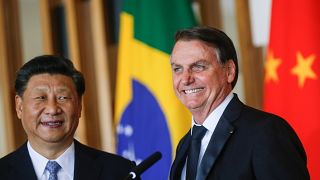What Does Crr Stand for in Banking
What's BRICS for and does it still make sense? Euronews answers
Comments
BySandrine Amiel &agencies

Brazil's President Jair Bolsonaro reacts next to China's President Xi Jinping as they deliver a joint statement after a bilateral meeting during the BRICS summit in Brasilia - Copyright REUTERS/Adriano Machado
Presidents of the group of major emerging economies — Brazil, Russia, India, China and South Africa (BRICS) — are meeting in Brazil's capital this Wednesday and Thursday for their 11th annual summit.
Together, BRICS nations represent about 42% of the world population, 23% of global GDP and 30% of the territory, the group's official website says.
Yet the five BRICS leaders are faced with both economic and political challenges. Their meeting will focus on stimulating investment in their countries amid a slowing world economy while patching up disagreements on issues such as Venezuela and Bolivia.
What's BRICS for and does it still make sense despite economic disparities and political divisions? Euronews answers.
How did BRICS begin?
The acronym BRIC was coined for the first time in 2001 by an analyst at Goldman Sachs bank to refer to the emerging powers that would be the five largest economies of the world in the 21st century, alongside the US.
At the time, the acronym didn't include South Africa, which joined in 2011.
Five years later, BRIC nations appropriated the term and started a political dialogue. In 2009, this dialogue was formalised into annual meetings of heads of state and government.
In 2014, a new institution was created under the BRICS umbrella: the New Development Bank (NDB), intended as rival a for the US and Europe-dominated International Monetary Fund (IMF) and World Bank.
NDP has a subscribed capital of $50 billion, of which $10 billion is paid capital. It has become one of the largest multilateral development banks worldwide.
What does BRICS stand for?
BRICS countries say they strive for "fairer international governance" in a multilateral system which they perceive as dominated by the Euro-American West.
"Since the beginning of their dialogue, in 2006, these countries have sought to establish fairer international governance, one that would be more suitable to their national interests," the group said on its website.
In a column published this Wednesday, Russian Foreign Minister Sergei Lavrov also detailed some of the values and policies that bind the group together.
"BRICS is becoming a magnet for many emerging economies. They are looking at us because the group protects values of multilateralism, supports a transparent, non-discriminatory, open, free and inclusive international trade, and rejects unilateral economic restrictions and protectionist measures in developing international economic ties," Lavrov wrote.
Can BRICS expand to other emerging economies?
At their meeting this week, BRICS leaders will discuss opening their development bank to other countries, officials said.
NDB President K.V. Kamath said the bank's membership is open to all members of the United Nations, while its mandate is to mobilise funds for sustainable development projects in BRICS and other emerging economies and developing countries.
"The membership will be expanded gradually," he told Reuters in an interview by email but declined to name any countries.
Does BRICS still make sense?
Economic divergence
In a note published last October, S&P Global Ratings said the grouping "may no longer make sense".
"The diverging long-term economic trajectory of the five countries weakens the analytical value of viewing the BRICS as a coherent economic grouping," S&P said.
While China and India's economic performance has been strong in the past two decades, Brazil, Russia and South Africa were below expectations.
Divergences between BRICS countries are not just economic but also political.
Political divisions
During his election campaign, Brazilian President Jair Bolsonaro accused China of "buying Brazil" and threaten to torpedo has threatened to torpedo bilateral ties.
Bolsonaro met his Chinese counterpart Xi Jinping on Wednesday, a bilateral exchange which experts say could help repair their relationship.
BRICS leaders will also seek to avoid confrontation over Venezuela, a key point on which Brazil disagrees with Russia and China. It will be discussed, though not publicly.
"Venezuela is not off the table, but it will not be mentioned in the joint declaration," a diplomat from one BRICS nation told Reuters.
The resignation of Bolivian President Evo Morales on Sunday brought another division within BRICS, as Brazil welcomed his departure as opening the way to fair elections whereas Russia called it a coup.
The New Development Bank has also been a focus of tensions. Some members countries criticized the institution for taking too long to deliver loans to help boost economies amid slowing global growth, creating impatience.
Impact on the global stage
"The much-hyped rise of the BRICS has lately been met with equally fervent declarations of their demise," Senior Lecturer in International Political Economy Kristen Hopewell noted in a 2017 publication.
But the researcher contests this assessment.
"Contrary to the widespread assumption that these countries are too diverse to ally, (...) the emerging powers displayed a remarkable degree of unity and cooperation, working in close concert to successfully challenge the dominance of the US and other established powers," the researcher wrote.
What Does Crr Stand for in Banking
Source: https://www.euronews.com/2019/11/13/what-s-brics-for-and-does-it-still-make-sense-euronews-answers
0 Response to "What Does Crr Stand for in Banking"
Post a Comment